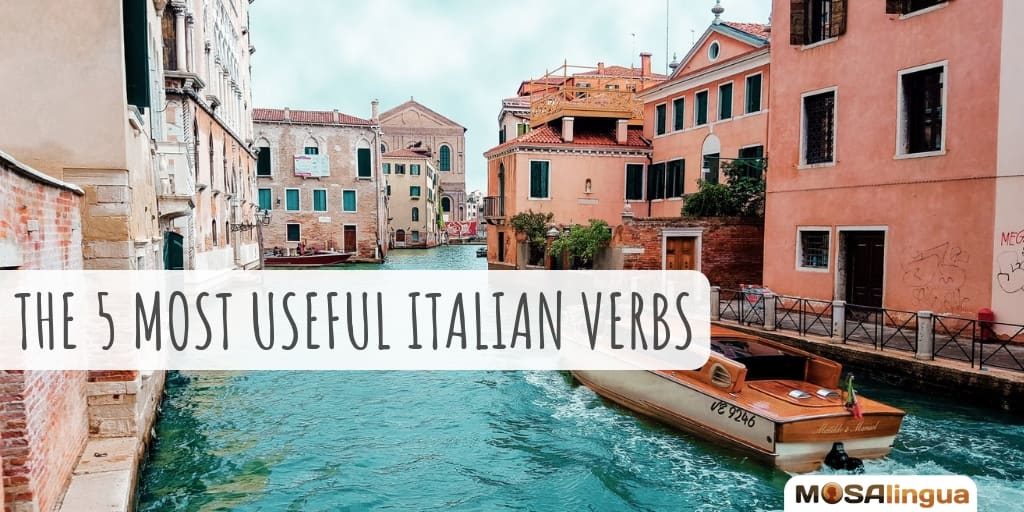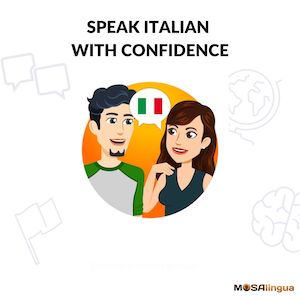The modal verbs potere, volere, and dovere are among the most commonly used verbs in Italian. The only “problem” is that they’re also irregular verbs… In other words, not so easy to learn. In this video, Mara, MosaLingua’s Italian teacher, gives you some tips on how to make your life a little bit easier. First, she presents the 5 most useful Italian verbs… and then she tells you how you can avoid using them. The expressions she’ll teach you can come in very handy, especially when you’re blanking on your irregular conjugations.

Top 5 Most Commonly Used/Useful Italian Verbs
In Italian, like in many languages, some verbs don’t follow the same conjugation patterns as most other verbs. And unfortunately, some of the most commonly used Italian verbs happen to be irregular. But don’t worry, because today we have some tips to make your life easier.
If you get stuck in the middle of a conversation and can’t quite remember how to conjugate one of these irregular verbs, there is usually a way around it. When this is the case, expressions with the helper (auxiliary) verbs “essere” and “avere“ can often come to your rescue to replace verbs like “potere,” “volere,” and “dovere.” With one of these auxiliary verbs and another regular verb in the infinitive form, you can get the same message across. And impress people with your speaking skills at the same time! Let’s take a closer look at how you can replace some of the most common and useful Italian verbs with other expressions.
1. Potere
The verb “potere” (to be able to) is used to talk about the ability to do something. If you can’t remember how to conjugate it, you can replace it with “essere capace di“ + infinitive.
For example:
- “Posso parlare in italiano” becomes “sono capace di parlare italiano” = I can speak Italian / I am able to speak Italian
- And “Puoi scrivere una email in italiano?” becomes “Sei capace di scrivere una email in italiano” = Can you write an email in Italian? / Are you able to write an email in Italian?
For this expression, you just need to know how to conjugate “essere” for the person you’re talking about.
2. Volere
The verb “volere” (to want) is all about willingness or desire. Again, you can replace it with another expression if you can’t remember its irregular conjugations. The expression “avere voglia di” + infinitive is a good substitute.
For example:
- “Oggi, c’è un sole bellissimo. Voglio andare al mare” becomes “Ho voglia di andare al mare“
- And “Voglio mangiare una pizza appena arrivo in Italia” becomes “Ho voglia di mangiare una pizza appena arrivo in Italia“
3. Dovere
The third modal verb, “dovere” (to need to, must, should) expresses need. The replacement expression I recommend is “avere bisogno di” + noun or infinitive.
For example:
- “Sono stanchissimo, devo prendere un caffè” becomes “Ho bisogno di un caffè” = I am very tired, I should drink coffee / I need coffee
- And “Ho una fame da lupi, devo mangiare” becomes “Ho bisogno di mangiare” = I’m starving, I should eat / I need to eat
4. Sapere
Other than the three modal verbs I just mentioned, “sapere” should also be on your radar of most useful Italian verbs. It’s helpful because it expresses knowledge. When in doubt, you can use the expression “essere capace di” + infinitive (this should look familiar from another verb!).
For example:
- “Ho imparato tante parole con MosaLingua. Ora, so parlare l’italiano” becomes “Ora, sono capace di parlare l’italiano” = I’ve learned so many words with MosaLingua, now I know how to speak Italian / I am able to speak Italian
- And “Dopo tanti anni di corso, ora, so nuotare” becomes “Ora sono capace di nuotare” = after several years of practice, I know how to swim / I am able to swim
5. Piacere
Another one of the most useful Italian verbs that you should definitely know is “piacere.” Stick an infinitive verb after it to talk about things you like or enjoy.
For example: “Mi piace parlare l’italiano” or “Mi piace andare a passeggio con te” = I like speaking Italian / I like going for walks with you
Video Tips
Much easier, isn’t it!? To go over these expressions again and hear them pronounced by a native Italian speaker, watch Mara’s video on YouTube or below.
There are subtitles if you need them; just click the gear icon and activate the language of your choice.
Don’t forget to subscribe to our YouTube channel for more video tips and lessons.
If you want to take your Italian grammar to the next level, here are some more articles to put on your reading list. Our articles focus on the practical aspects of grammar and how to put what you learn to use right away.
- All about irregular verbs in Italian
- Tips for learning Italian grammar the easy way
- Our complete guide on how to learn Italian quickly
Stay tuned for more Italian grammar lessons. While you wait, subscribe to our YouTube channel for other language tips and videos from the MosaLingua team.
Related posts:
Want to start improving your language skills today?
Improve your spoken Italian

Good news: we have a course for that! The Speak Italian with Confidence MasterClass.
It’s a comprehensive 8-module course designed to help you improve every aspect of your spoken Italian – fluency, confidence, pronunciation, and more – step by step, and enjoy doing it.




Comments